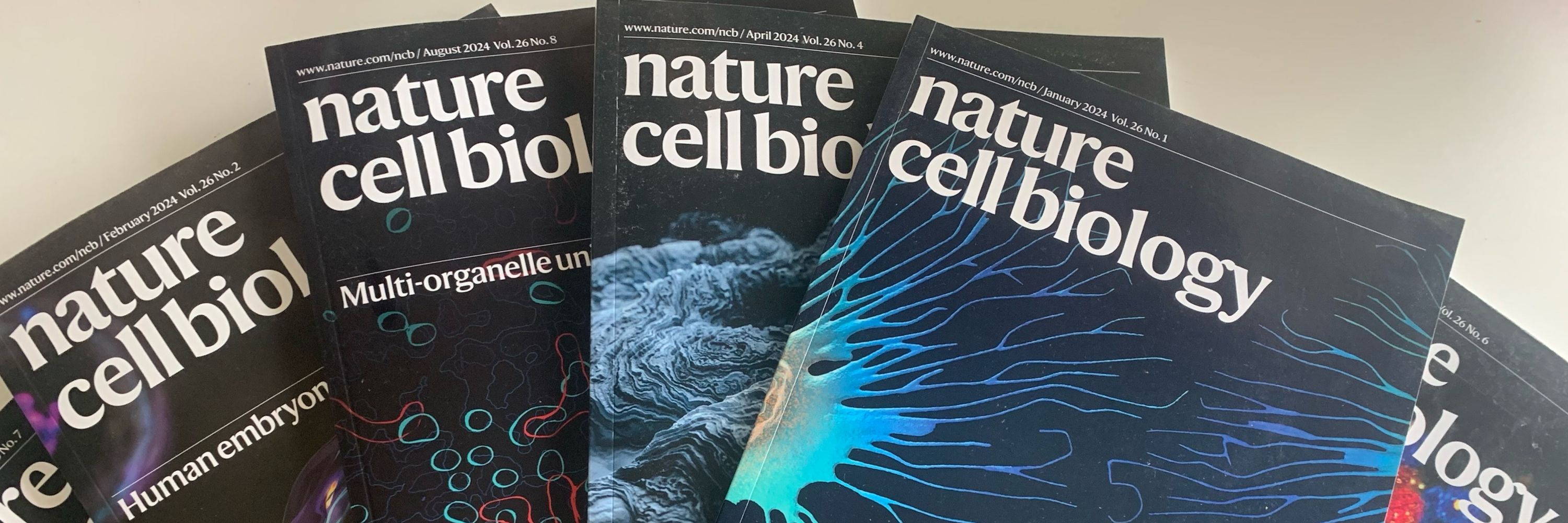
Cover: spatial #transcriptomics
👉Review: telomeric #chromatin
🔬 #mitochondria #mitophagy #senescence #p53 #epigenetics #glioblastoma #IDR #immunotherapy #cGASSTING #apoptosis #lysosomes & more!
www.nature.com/ncb/volumes/...

Cover: spatial #transcriptomics
👉Review: telomeric #chromatin
🔬 #mitochondria #mitophagy #senescence #p53 #epigenetics #glioblastoma #IDR #immunotherapy #cGASSTING #apoptosis #lysosomes & more!
www.nature.com/ncb/volumes/...
bit.ly/3Mvuvz1

bit.ly/3Mvuvz1
bit.ly/4chkfoD

bit.ly/4chkfoD
👉https://rdcu.be/e2Wxm
bit.ly/4aDyDWY

👉https://rdcu.be/e2Wxm
bit.ly/4aDyDWY
🔮Gain insight on methods publishing at our Methods Mythbusting on Jan 22. Our editor Sabrya Carim will be there!
👉FREE registration & more details:
www.protocols.io/blog/join-pr...

🔮Gain insight on methods publishing at our Methods Mythbusting on Jan 22. Our editor Sabrya Carim will be there!
👉FREE registration & more details:
www.protocols.io/blog/join-pr...
bit.ly/3LoaXw2

bit.ly/3LoaXw2
Cover: #epiblast development
👉Perspective: biological clocks
👉Review: #mitosis #CellDeath #inflammation
🔬 #chromatin #cancer #Bcells #Tcells #autophagy #organoids #mechanobiology #TranscriptionFactors #Xist & more!
www.nature.com/ncb/volumes/...

Cover: #epiblast development
👉Perspective: biological clocks
👉Review: #mitosis #CellDeath #inflammation
🔬 #chromatin #cancer #Bcells #Tcells #autophagy #organoids #mechanobiology #TranscriptionFactors #Xist & more!
www.nature.com/ncb/volumes/...

👉https://rdcu.be/eVPMa
www.nature.com/articles/s41...

👉https://rdcu.be/eVPMa
www.nature.com/articles/s41...
bit.ly/3LoaXw2

bit.ly/3LoaXw2
1 sentence is often enough; sometimes 2 are necessary. Provide a short, concise conclusion - what is the punchline? Do you have sth *important* to comment on regarding implications? Could be therapeutic implications or a finding that changes a dogma. Be specific.
The longest and main part of your abstract. Here you should explain:
i) what you did and how
ii) what you found
An effective abstract doesn’t bombard the reader with details; you can’t describe all your results. Stick to major.
*Must*: use friends from other fields as beta readers
Present the known and its caveat. It can be as brief as 1 sentence (we know x, but y (somehow linked to x) is unknown) or 2 sentences. My view is that abstracts with more than 2 introductory sentences rarely work well. Specific, clear, only the absolutely necessary.
1 sentence is often enough; sometimes 2 are necessary. Provide a short, concise conclusion - what is the punchline? Do you have sth *important* to comment on regarding implications? Could be therapeutic implications or a finding that changes a dogma. Be specific.
The longest and main part of your abstract. Here you should explain:
i) what you did and how
ii) what you found
An effective abstract doesn’t bombard the reader with details; you can’t describe all your results. Stick to major.
*Must*: use friends from other fields as beta readers
Present the known and its caveat. It can be as brief as 1 sentence (we know x, but y (somehow linked to x) is unknown) or 2 sentences. My view is that abstracts with more than 2 introductory sentences rarely work well. Specific, clear, only the absolutely necessary.
There’s not only one way, but there certainly is a “safe” and always successful recipe. Your abstract consists of 3 parts:
1st: 1-2 (max!) sentences - intro;
2nd: the longest - the findings;
3rd: 1 sentence (2 could work, but often unnecessary) - wrap it up.
The longest and main part of your abstract. Here you should explain:
i) what you did and how
ii) what you found
An effective abstract doesn’t bombard the reader with details; you can’t describe all your results. Stick to major.
*Must*: use friends from other fields as beta readers
Present the known and its caveat. It can be as brief as 1 sentence (we know x, but y (somehow linked to x) is unknown) or 2 sentences. My view is that abstracts with more than 2 introductory sentences rarely work well. Specific, clear, only the absolutely necessary.
There’s not only one way, but there certainly is a “safe” and always successful recipe. Your abstract consists of 3 parts:
1st: 1-2 (max!) sentences - intro;
2nd: the longest - the findings;
3rd: 1 sentence (2 could work, but often unnecessary) - wrap it up.
Present the known and its caveat. It can be as brief as 1 sentence (we know x, but y (somehow linked to x) is unknown) or 2 sentences. My view is that abstracts with more than 2 introductory sentences rarely work well. Specific, clear, only the absolutely necessary.

bit.ly/3N38jfy

bit.ly/3N38jfy
👉https://rdcu.be/eUZBi
bit.ly/4q7ozKQ

👉https://rdcu.be/eUZBi
bit.ly/4q7ozKQ
bit.ly/4pEAzU9

bit.ly/4pEAzU9
bit.ly/3N7xm0Y

bit.ly/3N7xm0Y
👉https://rdcu.be/eVPMa
bit.ly/4pNo2xL

👉https://rdcu.be/eVPMa
bit.ly/4pNo2xL
A human epiblast model reveals how dynamic TGF‑β signalling controls epithelial identity in early mammalian development
Here is the full paper: rdcu.be/eSWEs
🧵 A twittorial:
THREAD

A human epiblast model reveals how dynamic TGF‑β signalling controls epithelial identity in early mammalian development
Here is the full paper: rdcu.be/eSWEs
🧵 A twittorial:
THREAD
Cover: human trunk development model
🔬 #EmbryoModels #proteostasis #tRNA #ferroptosis #trogocytosis #mechanobiology #chromatin #TranscriptionFactor #epigenetics #ExtracellularVesicles #hematopoiesis #cancer #PhaseSeparation & more!
www.nature.com/ncb/volumes/...

Cover: human trunk development model
🔬 #EmbryoModels #proteostasis #tRNA #ferroptosis #trogocytosis #mechanobiology #chromatin #TranscriptionFactor #epigenetics #ExtracellularVesicles #hematopoiesis #cancer #PhaseSeparation & more!
www.nature.com/ncb/volumes/...

